New York State
• CUNY Students Demand: War Criminal Petraeus Out Now!
• Governor Cuomo’s Death Penalty for Public Schools
• Common Core Standards and Testing Regime Do Not Serve Enlightenment
• Can Education be Equated to Acquiring Skills?
• The Case for Examining the Political Significance of the Common Core
New York State
CUNY Students Demand: War Criminal Petraeus Out Now!
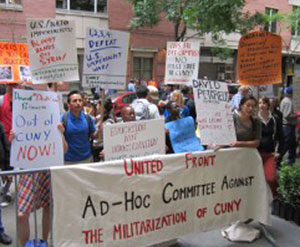 Students from the public City University of New York (CUNY) have been militantly protesting the appointment of retired General David Petraeus as an adjunct professor for CUNY’s Macaulay Honors College. Students from a number of the CUNY campuses and faculty stood together to reject Petraeus his first day of teaching. A larger demonstration was also organized outside a fundraiser for Macaulay where Petraeus spoke. Marching on the sidewalk the protesters chanted, 1,2,3,4 No to U.S. Imperialist War! 5,6,7,8 Petraeus Out, We Won’t Wait! They had signs targeting his role in increasing the use of drones, assassinations and torture in Iraq, Afghanistan, Pakistan, Yemen and elsewhere as head of the U.S. military’s Central Command (CentCom).
Students from the public City University of New York (CUNY) have been militantly protesting the appointment of retired General David Petraeus as an adjunct professor for CUNY’s Macaulay Honors College. Students from a number of the CUNY campuses and faculty stood together to reject Petraeus his first day of teaching. A larger demonstration was also organized outside a fundraiser for Macaulay where Petraeus spoke. Marching on the sidewalk the protesters chanted, 1,2,3,4 No to U.S. Imperialist War! 5,6,7,8 Petraeus Out, We Won’t Wait! They had signs targeting his role in increasing the use of drones, assassinations and torture in Iraq, Afghanistan, Pakistan, Yemen and elsewhere as head of the U.S. military’s Central Command (CentCom).
Signs and chants made clear that Petraeus was not welcome at CUNY and that students reject the militarization of education and life in general. These efforts also include opposing the return of the Reserve Officers’ Training Corps (ROTC) to CUNY. ROTC had been ousted from CUNY campuses in 1971 as part of anti-Viet Nam War resistance. The same administration hiring Petraeus is also giving campus space to the ROTC.
“War Criminal Petraeus Out of CUNY Now!” was their repeated demand. Signs read, CUNY is Not a Death Squad Training Camp! referring to the use of Special Forces death squads by Petraeus both in the military and as head of the CIA. Others demanded ROTC Out of CUNY Now. The students rightly took the stand that war criminals do not have the right to speak and promote their views for war. Students want them punished for their crimes, not given positions as teachers. ROTC is an instrument of aggressive war and also has no place on campus.
Students are continuing their protests against Petraeus on campus and wherever he can be found speaking in New York. They are rejecting efforts to impose war propaganda and promotion of the military as an integral part of their education. Such propaganda itself is a crime against the peace and students refuse to remain silent. Many of the students at CUNY are working class, from national minorities as well as immigrants from Central and Latin America. They are familiar with the brutality of U.S. wars and death squads, and the brutality of the New York Police Department (NYPD). In taking their stand they are demanding that education serve the interests of the students, not the U.S. military and its aims of world empire.
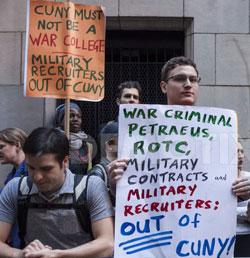 The demonstrators outside the fundraiser were viciously attacked by police. As commonly happens at such protests, students were on the public sidewalk, marching and chanting for a period of time without incident. Then police arbitrarily decided the action had to end. They acted to clear the sidewalk, marching a barricade down the sidewalk and forcing students into the street. Then students were attacked, with several leaders of the protest targeted, thrown to the ground and arrested. Video shows at least one being repeatedly hit and kneed by police while on the ground and another young woman thrown to the ground. Students were first held without charge and then given the usual charges police use to criminalize dissent — rito, disorderly conduct, resisting arrest and obstructing governmental authority.
The demonstrators outside the fundraiser were viciously attacked by police. As commonly happens at such protests, students were on the public sidewalk, marching and chanting for a period of time without incident. Then police arbitrarily decided the action had to end. They acted to clear the sidewalk, marching a barricade down the sidewalk and forcing students into the street. Then students were attacked, with several leaders of the protest targeted, thrown to the ground and arrested. Video shows at least one being repeatedly hit and kneed by police while on the ground and another young woman thrown to the ground. Students were first held without charge and then given the usual charges police use to criminalize dissent — rito, disorderly conduct, resisting arrest and obstructing governmental authority.
The violence was instigated and organized by the NYPD with the aim of disrupting the action and intimidating students. Instead students rallied round those arrested and reiterated their plans to keep demonstrating against Petraeus. Organizers from the Ad Hoc Committee Against the Militarization of CUNY stated that they have a right to protest and resist and will continue to stand with the world’s people in opposing U.S. war and war criminals like Petraeus. Weekly actions at his classes are planned as are support actions for those arrested. There is a broad demand, supported by the faculty, to Drop the Charges Against the CUNY 6!
It is worth noting that Petraeus is teaching a course titled “Are We On the Threshold of the North American Decade?” The class is said to be a seminar where students “examine in depth and then synthesize the history and trends in diverse public policy topics with a view towards recommendations for America’s leadership role in the emerging global economy.” The class is being given at a time President Obama is threatening more criminal aggression against Syria, and openly stating that he will act to use force when he decides, with or without authorization from Congress, the UN or international law. Petraeus also supported military action against Syria and called on Congress to back Obama.
It is also at a time when there is integration of the military and policing forces of the U.S., Canada and Mexico, with the U.S. in command. This is especially evident along the border but inside the countries as well. Arrangements for a state of the North American Monopolies are being finalized, including establishing and expanding the role of the military’s Northern Command, with responsibilities for military action inside the U.S. and all of North America. Petraeus’ class is designed to engage students in supporting this North America of the Monopolies, with U.S. use of force and violence trampling on the rights of the peoples its main features.
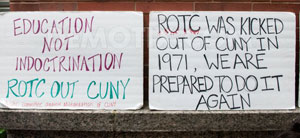 CUNY students have taken stands with the world’s peoples opposing war and demanding relations of mutual respect and benefit. They joined recent actions opposing war against Syria, and many against wars in Iraq and Afghanistan. They also stood with students in Quebec in 2012, as Quebeckers demonstrated for weeks against attacks on their rights. The CUNY students have rejected the U.S. “drug war,” at home, in Mexico and elsewhere — a war used to foment violence and impose mass incarceration of the youth. Indeed, as one of the name of one of the organizations active against Petraeus makes clear, they are Students Without Borders. They are united in defending rights abroad and at home and rejecting U.S. empire and wars.
CUNY students have taken stands with the world’s peoples opposing war and demanding relations of mutual respect and benefit. They joined recent actions opposing war against Syria, and many against wars in Iraq and Afghanistan. They also stood with students in Quebec in 2012, as Quebeckers demonstrated for weeks against attacks on their rights. The CUNY students have rejected the U.S. “drug war,” at home, in Mexico and elsewhere — a war used to foment violence and impose mass incarceration of the youth. Indeed, as one of the name of one of the organizations active against Petraeus makes clear, they are Students Without Borders. They are united in defending rights abroad and at home and rejecting U.S. empire and wars.
They are also determined to advance the fight for the right to education, including organizing for the aim and content of that education to serve the interests of the students and the needs of society as a whole for enlightenment. They are taking their stand against imperialist war and for discussion and work to build cooperation and unity with the youth of the world in solving the serious problems society faces. Stepping up efforts to oppose militarization in education, the economy and all spheres of life while organizing to defend rights abroad and at home continues to b e an important part of this fight.
[TOP]
Governor Cuomo’s Death Penalty
for Public Schools
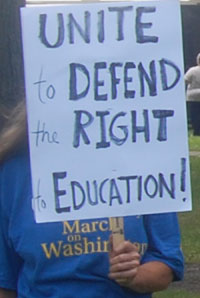 During a speech in Lockport, New York, Governor Cuomo issued a “death penalty for failing schools,” targeting Buffalo in particular. He elaborated that this death sentence includes a state takeover of public school districts, such as Buffalo, mayoral control of the school district in question, and more private charter schools.
During a speech in Lockport, New York, Governor Cuomo issued a “death penalty for failing schools,” targeting Buffalo in particular. He elaborated that this death sentence includes a state takeover of public school districts, such as Buffalo, mayoral control of the school district in question, and more private charter schools.
The proposals are similar to what was done in New Orleans, to a largely African American population, following the government-organized disaster of Hurricane Katrina. All the teachers were fired and networks of charter schools were imposed, with federal money used to rebuild privately run charter schools, not traditional public schools. The anarchy and destruction of public education in New Orleans is now such that parents do not know where to go to register their children for school.
Cuomo seeks similar drastic measures. According to the Buffalo News:
“In response to a question about Buffalo’s low-performing schools, the governor said that such schools — in Buffalo or any other district — should be given a short period of time to improve, ‘and then something dramatically has to happen, because we can’t allow these failing schools to continue.’”
New York State Commissioner of Education, John King similarly proposed “something dramatic.” Again targeting Buffalo in particular, last month King told WGRZ-TV:
“The Board of Regents has put forward a legislative proposal that would allow the board to remove a school board in a district that is chronically under-performing, and require the appointment of an education oversight board that would be similar to a fiscal control board.”
As experience with the Buffalo Control Board shows, such appointed boards are given power to control the budget, summarily terminate existing contracts, including imposing wage freezes, decide hiring, firing and more. And as New Orleans and Philadelphia show, actions to close public schools and impose privatized forms of education not accountable to any public body but using public funds will be pursued. Public school districts and a system of public education — required by the New York State Constitution — are to be eliminated.
Judge, Jury and Executioner
 Cuomo, in calling for a death penalty is positioning himself as judge, jury and executioner. He is deciding what constitutes a crime and punishment for it, though he is part of the executive branch, not the legislative or judicial. His stand, as an executive, to usurp power, reflects this general trend in governing arrangements today. President Obama also declares he can be judge, jury and executioner when it comes to Syria, or Iran or Korea or with drone attacks, assassinations, torture and spying. He openly says he is not constrained by U.S. or International law, by Congressional authorization or UN mandate.
Cuomo, in calling for a death penalty is positioning himself as judge, jury and executioner. He is deciding what constitutes a crime and punishment for it, though he is part of the executive branch, not the legislative or judicial. His stand, as an executive, to usurp power, reflects this general trend in governing arrangements today. President Obama also declares he can be judge, jury and executioner when it comes to Syria, or Iran or Korea or with drone attacks, assassinations, torture and spying. He openly says he is not constrained by U.S. or International law, by Congressional authorization or UN mandate.
The proposal for a death penalty, whether in the form of a state takeover or Control Board for school districts, is a proposal for the executive to rule over elected legislative bodies, as the existing Buffalo Control Board does. Whether the legislature passes such a law, just as whether Congress authorizes the crime of aggression, does not make it legal or just. Indeed, these legislative bodies have no right to remove themselves from power, just as the executive has no right to usurp it. Clearly it is the right of the people to stop such actions and deprive the executive of the powers it claims.
Further, promoting executive use of the death penalty is connected with the general militarization of public schools, that youth are to be trained to follow orders and submit to executive dictate. A war criminal like General Petraeus is to be given a teaching position, while those protesting him are attacked and arrested (see page 8). Resistance is criminalized, while violence and imposing the death penalty on millions in Iraq and elsewhere is rewarded.
Just as peoples and their resistance worldwide are criminalized, calling for the death penalty for public schools also indicates plans for the mass criminalization of students and educators. Cuomo is basically arguing that performing low on tests is a crime. This mass failure is being decided by the executive, from Obama, Education Secretary Duncan, Cuomo and King on down. It is based on a testing regime that uses arbitrary scoring methods designed to create mass failure. This regime is the basis for branding the large majority of Buffalo schools as “failing” and thus subject to this “death penalty.” It is a means not to raise the quality of public schools but rather to impose the closing of schools and the privatizing of school governance — a death penalty on the public and its right to govern public institutions.
It is the state that is organizing to commit the crime of refusing to guarantee the right to education. It is the state that is wrecking education, while blaming teachers, students and parents for the government’s crime. The public itself is being attacked, with public governance branded a “failure.” Indeed, the basis is being laid for the public itself to be seen as criminal.
Obama and Cuomo are essentially arguing that the public is the source of current problems, and that public schools in particular should be rendered illegal and criminal. This means that defending public education will also be rendered a crime.
The death penalty language is not meant for exaggeration. It is a warning to all that Cuomo is acting to criminalize public education and pubic governance. It is a call to teachers, students and parents to unite in defending the right to education and reject these efforts to blame and exclude the public. It is public right that needs to be defended while executive powers must be blocked.
[TOP]
Private Interests Taking Over Public Institutions
Common Core Standards and Testing Regime Do Not Serve Enlightenment
 As the new school year opens, students, teachers and parents are contending with implementation of the Common Core Standards and curriculum and testing based on them. In Buffalo and across the state there is widespread opposition to the testing regime as it is harmful to students, teachers and parents alike. People involved recognize this harm. Teachers, students and parents also have experience with the conditions needed for teachers to teach and students to learn. Yet this experience is to be ignored.
As the new school year opens, students, teachers and parents are contending with implementation of the Common Core Standards and curriculum and testing based on them. In Buffalo and across the state there is widespread opposition to the testing regime as it is harmful to students, teachers and parents alike. People involved recognize this harm. Teachers, students and parents also have experience with the conditions needed for teachers to teach and students to learn. Yet this experience is to be ignored.
The Common Core was not developed by educators. It was developed by and for private monopolies, including $1 billion in funding by Microsoft’s Bill Gates. It is being implemented by consortiums that are not accountable to the public. It is being instituted by New York and all but five other states nationwide (see p.13 for more).
Students, teachers and parents welcome and recognize the need for new curriculum to meet the needs of the present. They know that the conditions necessary for teaching and learning did not exist even before the Common Core’s testing and assessment regime was established. There is no doubt public education needs renewal, needs new content and forms. But instead of government playing a role to unite all to together decide how to strengthen public education and ensure it serves the needs of society, the Common Core is being used to put in place machinery to wreck public education. The testing, with its brutal negative impact on all is one example.
Further, recognition that education is to serve enlightenment, to arm the youth to solve social problems is also being eliminated. The Common Core, testing and teacher assessment are all part of a machinery designed in part to force everyone to abandon such an aim — to abandon the need to advance the quality of public education to serve the needs of society. Instead, all are being called on to join in wrecking it. Teachers are to administer and grade the tests, students to take them, principals to ensure this occurs, etc. Voice of Revolution urges all instead to reject this harmful dictate and organize together to find ways and means to collectively refuse to take the tests. Already many parents are refusing. . This stand of rejection needs to be built on and broadened, so that teachers, parents and students as collectives and as one, refuse to take the tests. Steps can be taken in each school, parents can play a role in going to various schools, students can together refuse.
Executives from President Obama to Governor Cuomo and Commissioner King are striving to prevent such united action by putting teachers on the defensive. They want to make it appear that teachers are the problem, the ones unwilling to meet standards and be held accountable. The opposite is the case.
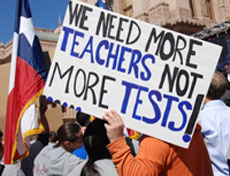 It is the executives who are arbitrary and unaccountable to the public. They are putting in place arrangements where decision making about education is being taken out of the hands of the public, including elected public bodies, and put into the hands of private interests. The tests are produced not by educators but private monopolies. Indeed teachers can be fired simply for discussing test questions with students and parents or even colleagues after the tests are done!
It is the executives who are arbitrary and unaccountable to the public. They are putting in place arrangements where decision making about education is being taken out of the hands of the public, including elected public bodies, and put into the hands of private interests. The tests are produced not by educators but private monopolies. Indeed teachers can be fired simply for discussing test questions with students and parents or even colleagues after the tests are done!
The governing arrangements for the Common Core are enabling private -interests to take over the public schools. School boards, local and state legislatures are being sidelined, as experience in Buffalo shows. Mayoral control, a control board for the schools, more private charters, are being floated as answers. What is needed instead is decision making by teachers, parents and students themselves. They are the ones standing up for enlightenment and rejecting the notion that students are things to be produced with a set of specific skills, rather than human beings with rights. We urge all concerned to discuss the importance of education for enlightenment and organizing to take public education in a direction that serves the public.
[TOP]
Experience with Common Core Testing and Modules
Can Education be Equated to Acquiring Skills?
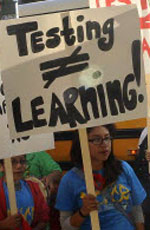 Teachers in the Buffalo area and elsewhere across the state are receiving the modules they are to utilize for teaching various courses, focused currently on English Language Arts, (ELA) and math. The modules are consistent with the Common Core States Standards now being implemented. These standards were designed by private monopolies. The curriculum puts emphasis on students acquiring skills and the testing is to see if they have done so.
Teachers in the Buffalo area and elsewhere across the state are receiving the modules they are to utilize for teaching various courses, focused currently on English Language Arts, (ELA) and math. The modules are consistent with the Common Core States Standards now being implemented. These standards were designed by private monopolies. The curriculum puts emphasis on students acquiring skills and the testing is to see if they have done so.
The modules are very detailed and specific, recommending not just general guidelines but specific questions to be asked, when and how, specific texts to be used, etc. Each has its list of skills to be learned and this is presented as an end in itself. The content called for is often incomplete. For example, teachers are being asked to have students read only a portion of a given book, say the first 5-6 chapters, not the whole thing. Similarly, a portion of a video is used, not the whole thing. Yet, absent the whole, students are then asked to draw conclusions.
Many teachers are already expressing concern about the very detailed instructions they are supposed to follow and texts chosen. Additionally, not a few are questioning the approach. It serves to impose false conclusions about a given book or video. The concept that -conclusions can be drawn absent knowledge of the whole and the context for the given material is also imposed. It is much like newscasts that provide some scattered facts and then draw conclusions about such serious matters as war and peace, or poverty, or government racism. Or educational matters like curriculum and teacher evaluations. It is an approach that disinforms and prevents conscious participation in world affairs or in learning at school.
The logic of such instructions becomes clear when connected to the aim given for teaching the material, which is the acquiring of particular skills. Or what could be called providing product specifications, with the student being the product. The aim is not enlightenment, of learning together what humanity has achieved, through literature or science for example, but rather a specific set of skills.
 As one teacher put it, skills are a means to something. But what is that something to be? A willing slave? A soldier engaged in war crimes? Take the example of children engaged in sports. They are taught definite skills. But the purpose of having the skills is to engage in the sport, to be part of a team, to learn together and so forth. The modules make it appear that acquiring the skills is the aim. This hides the actual aim, of the module, testing and Common Core more generally. Their aim is not to educate and enlighten students, but rather to force teachers and students alike to submit and take part in activity they know to be wrong and harmful. Teachers and students are not to be a force for advancing society, becoming informed and enlightened to solve its problems, but rather a regimented and docile force with specific limited skills as demanded by the monopolies. Study is not related to solving a given problem and tests are not related to assessing how far one has come in engaging and utilizing knowledge to solve social problems.
As one teacher put it, skills are a means to something. But what is that something to be? A willing slave? A soldier engaged in war crimes? Take the example of children engaged in sports. They are taught definite skills. But the purpose of having the skills is to engage in the sport, to be part of a team, to learn together and so forth. The modules make it appear that acquiring the skills is the aim. This hides the actual aim, of the module, testing and Common Core more generally. Their aim is not to educate and enlighten students, but rather to force teachers and students alike to submit and take part in activity they know to be wrong and harmful. Teachers and students are not to be a force for advancing society, becoming informed and enlightened to solve its problems, but rather a regimented and docile force with specific limited skills as demanded by the monopolies. Study is not related to solving a given problem and tests are not related to assessing how far one has come in engaging and utilizing knowledge to solve social problems.
Standards reflect the aims and outlook of those who establish them. The Common Core Standards and testing regime that comes with them were crafted by representatives of the monopolies and key state and federal executives. Educators and the public were actively excluded.
A key feature of the Core is this attempt to eliminate the aim, or purpose, for education generally and teachers and students in particular. The Core is premised on a model that views human beings as things to be exploited by the most powerful U.S. monopolies in their quest for the domination of markets, natural resources and peoples. Human will, or conscience is not to be tolerated. Integrity and principles are not to be tolerated. Thus the testing regime and Common Core are organized to repeatedly force all involved to compromise their conscience. Teachers, students, principals are to go against what their own experience and knowledge has shown is needed for educating youth and instead submit to administering and taking the tests, teaching the modules, and so forth.
Many teachers, students and parents in Buffalo, statewide and nationwide are rejecting these demands and fighting for rights. Their stand reflects the necessity to advance society. The aim of education cannot be to produce students who meet product specifications (“skills”) as though they were things — and not human beings with a role to play in changing the world. Education is a matter of enlightenment, of taking up study for purposes of solving definite problems in the world. As a teacher brought out, many of the youth of elementary age when asked what problems they want to solve answer, world peace and hunger. Yet their education does not have a whisper of such content in it!
[TOP]
The Case for Examining the Political Significance of the Common Core
 For the first time in American history, states have reportedly adopted a common “understanding of what students are expected to learn, so teachers and parents know what they need to do to help them.”[1] States have joined one of two assessment “consortia” developed to assess achievement of the goals embodied by those standards[2]. Taken as a whole, this is known as the Common Core State Standards Initiative.
For the first time in American history, states have reportedly adopted a common “understanding of what students are expected to learn, so teachers and parents know what they need to do to help them.”[1] States have joined one of two assessment “consortia” developed to assess achievement of the goals embodied by those standards[2]. Taken as a whole, this is known as the Common Core State Standards Initiative.
In the year 2007, there was no talk of common core standards, and previous attempts at developing “national standards” had been deemed “politically dead.” Six years later, such standards have not only been developed, they have been adopted by all but five states (Texas, Virginia, Alaska, Nebraska, Minnesota). Now a frenzied effort by a host of interconnected private interests and public officials are revamping K-12 curriculum and assessment like never before.
This is indeed an historic political achievement. Few would have predicted that early in the 21st century the United States would adopt something resembling a national curriculum, given its long standing commitment to “local control” and “state’s rights.” Of course, there is a long history to the increasing involvement of the federal government in education, dating all the way back to the Morrill Act, Smith-Hughes National Vocational Education Act, National Education Defense Act, not to mention Civil Rights rulings and legislation, and the recent saga in the growing federal role, No Child Left Behind (NCLB). […]
Such broad support from a variety of quarters for something anathema to the American creed is intriguing. The development suggests a radical change in the roles of federal, state and non-public entities in governing education.
Official press releases, news and commentary about the CCSSI remains narrowly focused on whether or not, and mostly how, this initiative will improve education. Much attention is being paid to certain technical details of implementation, and getting “everyone on board.” And for the most part, critics of the CCSSI simply argue that the initiative will not improve the quality of schooling in the United States[3].
Despite the obvious shift in how schools are governed, few seem to entertain the governance question. What is missing, then, is an analysis of how the CCSSI affects and reflects changes in governance — not just of education, but governance in general. Put differently, even if the CCSSI fails to improve the quality of education, what lasting changes in the United States system of governance have already taken place as a result of the CCSSI? Has decision making power over curriculum and assessment changed? Who now holds that power? What is the political significance of these changes? What is the significance of such change occurring through the restructuring of public education? What functions was public education to perform and how are these functions changed with the arrival of the CCSSI? […]
An Outline of The Political Significance of the Common Core
 We are no doubt experiencing significant change to our political and economic institutions. These changes are not only taking place inside the United States, but across the globe. While these changes are by no means singular in the nature, evidencing as much contention as consensus, general patterns do exist. Various terms are commonly attached to these changes: globalization, neoliberalism, denationalization, privatization. The patterns that these words describe form the context in which the CCSSI emerged. In this sense, the CCSSI must be understood as both a response to and means for institutionalizing changes associated with these larger trends.
We are no doubt experiencing significant change to our political and economic institutions. These changes are not only taking place inside the United States, but across the globe. While these changes are by no means singular in the nature, evidencing as much contention as consensus, general patterns do exist. Various terms are commonly attached to these changes: globalization, neoliberalism, denationalization, privatization. The patterns that these words describe form the context in which the CCSSI emerged. In this sense, the CCSSI must be understood as both a response to and means for institutionalizing changes associated with these larger trends.
But it is unlikely that the political significance of the CCSSI will be fully grasped if left there. Yes, I have no doubt that the CCSSI is an expression of neoliberalism, a form of privatization, representing a type of denationalization, but without a detailed analysis of how it alters political institutions inside the United States, important features of the CCSSI will be missed[4].
A main function of the political architecture of the United States is to avoid or block “tyranny.” Tyranny in this sense refers to both an overbearing central government (the Federalist system is designed to share power between federal and state authorities, and is biased towards “local control”) and a political arrangement where legislative power (law making and control of the treasury), judicial power (legal interpretation and application of law to conflict) and executive power (enforcement of laws, police powers) are institutionally separated and provided means for defending themselves against the encroachment of other branches of government (e.g., the veto power of the President can be used to “check” the power of Congress; congress can impeach the President; to promote court independence, Supreme Court justices are appointed for life). This arrangement of “separation of powers” dates back to the time of the Roman Republic.
While the framers of the Constitution were mainly concerned with avoiding “the tyranny of the majority” (what might be thought of as direct or real, as opposed to “representative”, democracy) they were also interested in crafting arrangements that would block concentration of power into one office, especially at the federal level. In this sense, State power was to be a block to an overgrowth of Federal power. Thus, the reservation of many powers for the States (or the people themselves) in Article X of the Constitution. Federalism was also designed to use states as testing grounds for new policies and programs (e.g., the No Child Left Behind Act was premised on education policy as enacted in Texas).
While [some have] argued that the Obama Administration’s Race to the Top reform initiative represents a “federal power grab,” many remain silent regarding the political affect of the CCSSI. […] Yet, it is not so clear that the CCSSI is a “federal power grab” — at least in the common understanding of what that would mean. In fact, all four major institutions that directly govern the initiative are non-public, 501c3s. They are: the National Governors Association (NGA), the Council of Chief State School Officers (CCSSO), and the two assessment apparatuses, the Partnership for Readiness for College and Career (PARCC) and Smarter Balanced Assessment Consortium (SBAC). While there is no doubt that the power and influence of the U.S. Department of Education (USDOE) was instrumental in bringing about the CCSSI, little direct authority (which must be distinguished from influence) over the CCSSI appears to rest with USDOE administrators.
Yet, as Race to the Top operates on incentives and is based on granting waivers from NCLB testing requirements on the condition that states comply with Race to the Top initiatives, including the CCSSI, an argument can be made that USDOE — an executive body — has actually engaged in law making. So, while USDOE policy may not specify that the USDOE has direct control over curriculum, etc., it might nonetheless represent a significant departure from Constitutionally authored practice.[7] The point is to be open to dynamics that do not fall neatly into the “state’s rights” vs. “federal power” framework. Maybe the federal government used (illegally) its power to remove components of the governance of public schools from public authorities at both the federal and state levels? Isolating the role of the USDOE and other federal authorities in bringing about the CCSSI and how these roles change federal power and influence [is important].
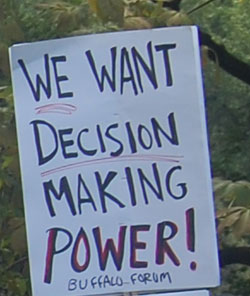 Substantive power over the initiative [does not] reside within the states either (which is different from saying some state officials might have substantial power). In fact, at both the federal and state level, there appears to be little role for the legislature. The role of local educational authorities (LEAs) or “local school boards” has been diminished over the last several decades under a variety of auspices (e.g., mayoral control, “control boards” and emergency financial mangers, etc.). In the case of the USDOE, congressionally approved funds (namely Race to the Top) are being expended free of congressional oversight. State legislatures, likewise, seem to have little role in the CCSSI, other than to possibly rubber stamp it as required by Race to the Top application “guidelines” (even if a state legislature did consciously adopt the CCSSI, they would have, it appears, legislated themselves out of power!). In fact, the long standing state control over public school curriculum and assessment seems to have largely vanished, at least as it existed in its past forms. The details and significance of this development must also be explored.
Substantive power over the initiative [does not] reside within the states either (which is different from saying some state officials might have substantial power). In fact, at both the federal and state level, there appears to be little role for the legislature. The role of local educational authorities (LEAs) or “local school boards” has been diminished over the last several decades under a variety of auspices (e.g., mayoral control, “control boards” and emergency financial mangers, etc.). In the case of the USDOE, congressionally approved funds (namely Race to the Top) are being expended free of congressional oversight. State legislatures, likewise, seem to have little role in the CCSSI, other than to possibly rubber stamp it as required by Race to the Top application “guidelines” (even if a state legislature did consciously adopt the CCSSI, they would have, it appears, legislated themselves out of power!). In fact, the long standing state control over public school curriculum and assessment seems to have largely vanished, at least as it existed in its past forms. The details and significance of this development must also be explored.
And, while the executives of each state constitute the membership of the NGA and CCSSO, and state representatives participate in the governance of the assessment consortia, neither of these organizations seems to exist as a means to represent individual state interests or the interests of the electorate of each state (i.e, they do not operate as units of a federalized system). The nature of these arrangements must also be explored, although, since they are 501c3s, their internal workings are not easily subjected to public study. Of course, that fact alone is politically significant.
So, while the Constitution provided means to both block the tyranny of the majority and the tyranny of a strong central authority (blocks which are now obviously permeable), it seems to have no specific means for limiting the power of non-public power over public affairs (e.g., powerful foundations, a different kind of tyranny of the minority) or for stopping the government from privatizing functions of governance (e.g., turning over the role of a legislature to a 501c3). Given the tremendous concentration of wealth that has occurred over the past three decades, this is a key concern, as concentration of economic power yields concentration of political power. Certainly the role of venture philanthropy (e.g., Gates, Broad) rivals the power of the USDOE in terms of bringing about the CCSSI, power based on accumulation of massive private fortunes.[8]
In this sense, the increasingly dominant role of 501c3s in the sphere of education policy and governance warrants a careful analysis of that category of institution and its original and putatively changing role in the political life of the United States.
Finally, in American political thought, public education — controlled by local and state authorities — was itself given as a bulwark against tyranny, and as a means for “the common man” to counter the political power afforded the economic elite. In this sense, traditional public schools were not only presented as “citizen making” institutions, and as a “great equalizer” and the “balance wheel” of society, they were also given a political function, a means of sustaining republican democracy through the expansion of publicly controlled education for the people at public expense as this in itself was thought to mitigate the extreme accumulation of political and economic power. The political significance of the privatization of a system with such a function must also be analyzed.
Notes
[1] These are the words of the CCSSI: http://www.corestandards.org. I had originally written “common curriculum” but in fact the Core is a set of expectations about what students are to be able to do. Ostensibly, curriculum is to be built around the expectations, although the underlying sense that they are “product specifications” suggests an elimination of curriculum (products don’t need curriculum), in the normal sense of the word.
[2] These are an outcome of the Race to the Top Assessment Program; see: http://www2.ed.gov/programs/racetothetop-assessment/index.html
[3] See: Tienken, Christopher H. “Common Core Standards: The Emperor Has No Clothes, or Evidence.” Kappa Delta Pi Record 47, no. 2 (2011): 58-62.
[4] Ball, Stephen J. Global Education Inc. : New Policy Networks and the Neo-Liberal Imaginary. Abingdon, Oxon ; New York: Routledge, 2012.
[5] See: http://dianeravitch.net/2012/07/09/my-view-of-the-common-core-standards/
[6] See: http://www.k12innovation.com/Manifesto/_V2_Home.html; and http://online.wsj.com/article/SB10001424052702303630404577390431072241906.html; and http://www.indystar.com/article/20130112/OPINION07/301120307/Russ-Pulliam-Common-Core-foes-hope
[7] http://educationnext.org/u-s-dept-of-ed-is-breaking-the-law/
[8] My most recent estimates show that the Gates foundation has, between 2009 and 2012, spent nearly $1billion to realize the CCSSI.
[TOP]
